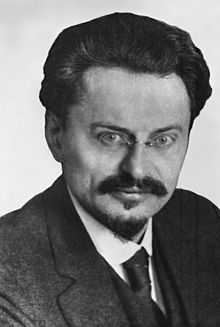Leon Trotsky
![]()
Trotsky is a redirect to this article. For other persons see Trotsky.
Leon Trotsky (Russian Лев Троцкий Lev Trotsky, viss. Transliteration Lev Trockij; b. 26 Oct. Jul. / 7 Nov. 1879greg. as Lev Davidovich Bronstein, Russian Лев Давидович Бронштейн, transliteration Lev Davidovič Bronštejn in Janovka, Kherson Governorate, Russian Empire; † 21. August 1940 in Coyoacán, Mexico) was a Russian revolutionary, communist politician and Marxist theorist.
Trotsky, as he called himself from 1902, was the key organizer of the October 25-July 7, 1917greg. revolution that brought the Bolsheviks to power under the leadership of Vladimir Lenin. , which brought the Bolsheviks to power under the leadership of Vladimir Lenin. In the government subsequently formed, he was People's Commissar of Foreign Affairs, War, Food, Transportation, and Publishing. As Commissar of War he founded the Red Army, in whose organization and in whose victory in the Russian Civil War he played a major part. After Lenin's death in 1924, Trotsky was increasingly disempowered by Joseph Stalin, forced into exile in 1929, and assassinated by a Soviet agent in Mexico in 1940.
The direction of Trotskyism that deviated from the Soviet party line of Marxism-Leninism was named after him.

Lev Davidovich Bronstein, called Leon Trotsky (c. 1929)
Reception
After his expatriation, Trotsky increasingly fell into the damnatio memoriae in the Soviet Union: his achievements for the party and the prominent role he had played in the October Uprising, in the building of the Red Army or in the bloody suppression of the Kronstadt Uprising were concealed, denied or denounced. In the Short Course in the History of the CPSU (B), an official account published under Stalin's aegis in 1938, his role in October 1917 was reduced to that of an adversary of Lenin and a loudmouth who had betrayed the date of the uprising and thus jeopardized its success.
Even more radically, the memory of Trotsky was erased from Soviet visual memory. Photos showing him with Lenin or Stalin were cropped or retouched. The most famous examples are the pictures Grigori Goldstein took of Lenin speaking in front of the Bolshoi Theater in Moscow on May 5, 1920: In the 1930s, only sections of the picture that did not include Trotsky were allowed to be published; in the 1960s, he was retouched out of the picture altogether.
Still in 1940, Trotsky's murderer Ramón Mercader was awarded the Order of Lenin by Stalin, and the medal was given to his mother. After serving a 20-year prison sentence, Mercader was awarded the title of Hero of the Soviet Union on 31 May 1960 and invited to Moscow. There, in 1961, he was presented with the Star of a Hero of the Soviet Union along with the corresponding Order of Lenin.
The CPSU never rehabilitated the revolutionary leader and Red Army organizer, and both Nikita Khrushchev and reformer Mikhail Gorbachev denied him any posthumous tribute. In 1987, the news magazine Der Spiegel published an interview with former dissident Roi Medvedev on Bukharin's rehabilitation and a report that Gorbachev confidant Yegor Yakovlev called Stalin's arch-enemy a "hero and martyr." In 1989, however, Yakovlev told German politician Gregor Gysi: "Trotsky was a merciless man whose hands are stained all over with blood."
Trotsky's son Sergei Sedov, who was deported and murdered in 1937, was rehabilitated in 1988. Trotsky's previously banned writings were published in part in 1987, then in full from 1989.
.jpg)
West German student movement of the 1960s
Man at the Crossroads/Man controls the Universe , detail with portrait of Trotsky, Diego Rivera
Lingering
Even at the beginning of the 21st century, small and larger Trotskyist associations exist in many countries. In Britain, France and some Latin American countries, such as Mexico, larger Trotskyist organizations have survived and are also gaining in importance there again in recent years. The Fourth International is now split into several associations whose influence is severely limited.
See also: Trotskyism
Questions and Answers
Q: Who was Lev Davidovich Bronstein?
A: Lev Davidovich Bronstein was a Russian revolutionary and political theorist of Jewish-Ukrainian descent. He is also known by his public name, Trotsky.
Q: What is the theory of Permanent Revolution?
A: The theory of Permanent Revolution was originally thought up by Karl Marx and expanded upon by Trotsky. It holds that revolution should be continuous until all classes are equal and the state is abolished.
Q: What did Trotsky do during the 1905 Russian revolution?
A: During the 1905 Russian revolution, Trotsky helped organize a committee of workers in St Petersburg called the Soviet and became its leader when its original leader was arrested.
Q: How did Stalin come to power?
A: After Lenin's death, there was a power struggle between Trotsky and Joseph Stalin for leadership of the Bolshevik party. Stalin won this struggle and came to power as leader of Russia.
Q: Why did Trotsky have to leave Russia?
A: After losing the power struggle with Stalin, Trotsky had to leave Russia for his own safety as Stalin wanted to harm him.
Q: What is meant by "Trotskyism"?
A: People who believe in Trotsky's ideas are referred to as "Trotskyists" or followers of "Trotskyism". This refers to a more democratic form of communism than other forms such as Stalinism or Maoism.
Q: How does George Orwell represent Leon Trotskiy in Animal Farm?
A: In George Orwell's novel Animal Farm, Leon Trotskiy is represented by Snowball the pig while Joseph Stalin is represented by Napoleon who was also a pig. The book reflects real world events at that time period in history
Search within the encyclopedia